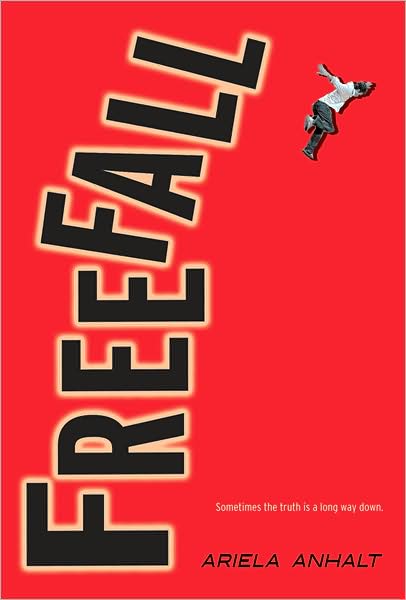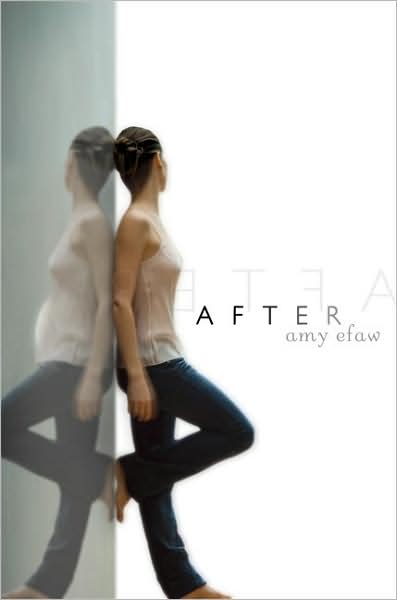4Q 3P; Audience: S
 Three boys went up to the cliff. Two came down alive. One didn't. Did Russell fall or was he pushed? If he was pushed, was it on purpose or not? Luke is the only known eyewitness, and everyone wants him to tell what he saw that night. Hayden is his best friend and roommate, but if Luke is being honest, he knows that Hayden pushed Russell that night. But he's not sure what Hayden's intentions were when he did it. Trying to figure out what happened and why is tearing Luke up, and he can't bring himself to talk about it.
Three boys went up to the cliff. Two came down alive. One didn't. Did Russell fall or was he pushed? If he was pushed, was it on purpose or not? Luke is the only known eyewitness, and everyone wants him to tell what he saw that night. Hayden is his best friend and roommate, but if Luke is being honest, he knows that Hayden pushed Russell that night. But he's not sure what Hayden's intentions were when he did it. Trying to figure out what happened and why is tearing Luke up, and he can't bring himself to talk about it.This isn't a book you pick up when you want a nice, cozy read. Luke's a mess. Not only is he dealing with the events up on the cliff, he's dealing with his father's suicide and its aftermath. He's angry, he's lonely, he's confused, he's guilty, and he's in a lot of pain. Like Cass and Tim in Give Up the Ghost, he needs help and refuses to ask for it. My heart ached for him, but I also got annoyed, because people do try to help him, and he rejects them every time. That's consistent with his personality and his issues, but it sure was frustrating! I felt the strengths in this book were the build-up of tension (internal and external) in a very narrowly focused storyline, Luke's very realistic struggles with deciding not only what he saw but what is the right thing to do about it, and the characters' interactions. Anhalt is still a college student herself (at Dartmouth), and she's right on the money with the way teens and young adults speak to each other. (People who object to cursing in general or in books should keep that in mind.) This book may not fly off the shelves, but a good booktalk should sell it to readers who enjoy introspective reads and character development over plot.
Crazy Beautiful by Lauren Baratz-Logstead
3Q 3P; Audience: J/S
 Lucius blew off his arms in an explosives experiment that went horribly wrong. Instead of replacing them with realistic prosthetics, he's opted for hooks, a pretty clear indication that he intends to keep people at a distance. A very intelligent loner even before his accident, Lucius has come to accept his outcast status. That changes when Aurora steps onto his bus. Not only is Aurora beautiful, but she also is somehow both willing and able to look past his disfigurement to see the person he truly is. That's actually a somewhat frightening prospect, because Lucius has secrets he's not proud of, and the thought that learning the truth about his accident and the kind of guy he used to be might make Aurora shun him scares him. But Aurora knows more about pain and loss than Lucius suspects, and a tentative friendship begins. It's a friendship that doesn't go down well with the popular kids, especially Jessup, who has his eye on Aurora too. Jessup sets in motion a plot to make Lucius pay for attracting Aurora's attention, and soon Lucius finds himself even more of an outcast than he was before. Even Aurora has turned against him. Now what?
Lucius blew off his arms in an explosives experiment that went horribly wrong. Instead of replacing them with realistic prosthetics, he's opted for hooks, a pretty clear indication that he intends to keep people at a distance. A very intelligent loner even before his accident, Lucius has come to accept his outcast status. That changes when Aurora steps onto his bus. Not only is Aurora beautiful, but she also is somehow both willing and able to look past his disfigurement to see the person he truly is. That's actually a somewhat frightening prospect, because Lucius has secrets he's not proud of, and the thought that learning the truth about his accident and the kind of guy he used to be might make Aurora shun him scares him. But Aurora knows more about pain and loss than Lucius suspects, and a tentative friendship begins. It's a friendship that doesn't go down well with the popular kids, especially Jessup, who has his eye on Aurora too. Jessup sets in motion a plot to make Lucius pay for attracting Aurora's attention, and soon Lucius finds himself even more of an outcast than he was before. Even Aurora has turned against him. Now what?This story has some beautiful moments, especially in scenes between Lucius and Aurora. Told in first person by both characters, we frequently see the same scene from both points of view, which can be illuminating. Lucius has enough warts to make him intriguing. He doesn't spill all his secrets right away, so we don't know what happened to him or why. He's clearly intelligent, and he clearly has always felt superior to most of the people around him. He's also guilty about what he did (whatever it was) and how it's affected his family. You get the sense that he's not who he used to be and that he's realized he'd like to be a bit more a part of things, but he doesn't quite know how to go about this business of being friendly, let alone being a friend. For the most part, I thought Baratz-Logsted handled his attempts to grow quite deftly. Aurora is a far more idealized character. She's handling the death of her mother with grace. Immediately accepted into the in crowd at her new school, she is aware enough to realize that she may not want to be a part of it and that Lucius is a more authentic, interesting person to be with. It is impossible not to feel drawn to her. She's the epitome of nice, sweet, and friend. So once Jessup's plot started rolling, I was surprised she didn't see through it and nip it in the bud. This is when the book started to strike some significantly discordant notes for me. I flat out didn't believe the ending. Without saying too much, questions weren't asked by characters who would have asked them, and Lucius becomes some sort of magician in his ability to make people listen to him when they never have before, in situations where they were not at all likely to be willing to listen. I understand that this is supposed to be a retelling of Beauty and the Beast, but this fairy tale ending didn't match the rest of the story.
Some of the writing is beautiful and evocative. I'm not going to quote widely here, but here are two sections that I marked:
I feel as though my whole body could explode at her touch. Nobody ever touches me if it can be avoided. And, for the most part, I have been content to keep the world at this distance; at arm's length, if you will. But not now. This is the first time that anyone outside my family has touched me in a very long time, and my entire body feels it, enjoys it, fears it. (p. 119)
This is, I think, what it must mean to be human: to want something good for someone else. (p. 126)




